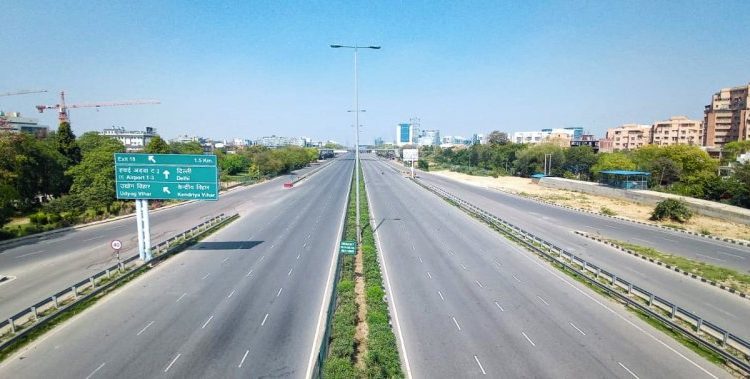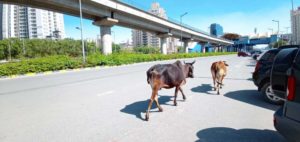Positive Side of COVID19-induced Lockdown: Blessing in Disguise
By Dr. Dillip Kumar Kar
As you all know that the whole world is under the threat of Novel Coronavirus, officially called COVID–19. To avoid the spread of this deadly virus, several countries like – India, United Kingdom, Australia, Italy, Denmark, Ireland, Spain, Germany, Portugal, Czech Republic, France, Belgium, Norway, China, Slovenia, Indonesia, El Salvador, New Zealand, Poland, and Switzerland, etc. have resorted to stricter means of locking down either the affected regions or the whole country to ensure social distancing.

India is the first country in the world that locked down the whole of the nation forcing the entire 1.3 billion population to remain confined to their homes during the first stage of the virus outbreak.
During the lockdown period, the entire population is facing several difficulties but as it is said “Every action has a same and opposite reaction” as a result several good reactions (for the human society) are being experienced. Some of those good reactions are described here as under.
- Pollution level of air is drastically decreased: The COVID-19 lockdown has led to cleaner air. Lockdown resulted in a big improvement in the air quality, mainly for nitrogen dioxide (NO2) levels in major cities of India. As per MORTH and Delhi Transport Department, total vehicles were registered in the Delhi-NCR region was 19 crores including about 33.40 lakhs four-wheelers and 73.11 lakh two-wheelers due to which the pollution level of Delhi-NCR was in the top of the list. Since the day of “Janata Curfew” on March 22 and lockdown since March 25, a negligible number of the vehicle are plying in the Delhi-NCR region to date. As a result, as per the assessment of the Central Pollution Control Board of India, the air quality of Delhi-NCR, as well as all that of other metro cities of India, has improved drastically. In the capital, New Delhi, government data shows the average concentration of PM 2.5 plunged by 71% in the space of a week — falling from 91 micrograms per cubic meter on March 20, to 26 on March 27, after the lockdown began. The World Health Organization considers anything above 25 to be unsafe.
- Clear visibility of the blue sky: Since the Industries, Vehicles, Aeroplanes, Ships etc. have stopped running, the presence of smoke and carbon dioxide gases in the air has been drastically decreased. Due to this reason, the visibility range has increased. The sky is returning to its ancient glory with chirping birds and dazzling stars. India’s Central Pollution Control Board says that there is a dramatic improvement in the air quality in 85 Indian cities of the country during this 21 days lockdown period. Visibility of snow-capped Dhauladhar mountain range of Himalayan range on Friday midnight, 24th March, 2020 from the Jalandhar city of Punjab (Ariel distance between Dhauladhar mountain range and Jalandhar city is 100 miles) after about 30 years as pollution dipped across Punjab can be taken as an example to measure the clarity of the sky due to COVID–19 lockdown.
- Pollution level in water is also drastically decreased: During the lockdown period the polluted water of Yamuna, Ganga and other rivers of India became free from different pollutants. While the water samples of the Yamuna River measured, it was seen that the degree of chemical oxygen demand (COD) and ammonium nitrate would point to whether the lockdown has had an impact. Mathuria said that “effluents from industries as well as sewage discharge would impact COD levels” (The Washington Post – April 11, 2020 at 2:30 p.m.). As per the Vice-Chairman Delhi Jal Board, Raghav Chandra “the stoppage of industrial pollutants and industrial waste has definitely had a positive effect on water quality” (The Washington Post – April 11, 2020, at 2:30 p.m.).
-
![]()
Cattles reclaim their space on vehicle-less roads. Animals roaming freely and fearlessly due to lockdown: Since human activities stopped on roads, farms, industries, offices, schools, etc. wild animals started roaming even outside their normal territorial area. During the lockdown period, several animals can be seen roaming in the streets of cities and villages. It is seen that deer tend to come out of their territory to explore since all roads became calm. Recently, deer from a park in Nara, Japan were spotted walking through the streets. Mountain goats took the advantage of lockdown and started roaming on the streets of Llandudno of North Welsh. A pair of whales were found playing just off the Mediterranean coast of southern France in the first week of this month. Elephants are happily moving on roads in India and Sri Lanka. A swarm of hungry monkeys descended on a plaza in Lopburi, home to the Phra Prang Sam Yot monkey temple in Thailand. Wild turkeys made their way onto the campus of an elementary school in Oakland, California, while classes were canceled because of the coronavirus outbreak. Coyote sighted looking for food on the street of San Francisco.
In India, three Sambar deers were spotted walking on a street of Uttarakhand. An elephant was captured in Dehradun city of Uttarakhand State. Nilgai was found strolling in Noida city of Uttar Pradesh. An Indian civet was spotted in Kerala’s Kozhikode city. Olive Ridley Turtles came ashore a beach in Odisha. Peacocks were seen dancing on the streets in Mumbai city of Maharashtra. A leopard was roaming very close to an Air Force base near Patna in Bihar. A bison passed through a marketplace in Karnataka. In the Kodagu district of Karnataka, elephants were seen walking on the roads happily. Spotted and Sambar deer were also found roaming freely.
- Wild birds are seen flying fearlessly: Since the noise pollution stopped birds started to fly fearlessly. Years before we could commonly see the birds like – Tailorbird, Sunbird, Asian Koel, Kingfisher including White-throated Kingfisher, sparrow, crow, Bulbul, Humming Bird, Crain bird, Parrot, Peacock etc. near to our village areas. These species are disappeared for a long time and due to lockdown due to minimal noise pollution now they were spotted in different places of India. As noise pollution is minimal bird’s movement started even in urban areas. K. Mohan Raj mentions how a Bulbul was building a nest on the Verandah of his house in Kanuvai, Coimbatore (The Hindu – March 26th, 2020). Mohan says and I quote “now is the best time to appreciate the natural world around us. “Birds seem to be happy calling out to each other from long distances.” Go to your backyard, balcony, terrace, look out your window”.
Priyanka Nagaraj, a student, said she has observed an increase in the number of birds on trees in her locality in Railway Layout, Vijayanagar, in the city. “I have the habit of watching birds on trees near my house in the morning. I am happy since the last few days because I see more numbers and also newer species of birds,” she said (Sathish Kumar, DHNS, Mysuru, MAR 28 2020).
Due to COVID–19-induced lockdown across the whole of India, vehicular traffic has been declined to almost zero. Industries billowing black smoke into the atmosphere is closed. Construction sites that are usually buzzing with activity, spewing dust and dry cement particles into the air are eerily vacant and due to this reason drastic improvements in air and water quality, visibility of sky, etc. have taken place. The whole world is worried about global warming caused by these activities in our daily life. The lockdown has taught us a lesson to minimize our unnecessary activities as much as possible. For example, office work can be done very easily online through some specific e-applications/software, online teaching and learning activity can be introduced for at least above 10th standard students, Books can be read through E-libraries, news can be read by e-newspapers, Films can be watched through TV sets or home theaters, Bank transaction/loans, etc. can be done through E-application/software/mobile Apps, Purchasing different consumer goods can be done electronically and so on. It is, therefore, the Governments of different countries are humbly requested to take necessary steps in this regard at their earliest, if they are sincerely worried about global warming as well as want to see the ancient natural glory on the Globe.
(Views expressed in the article are that of the author)
About the Author:
Dr. Dillip Kumar Kar is working as Asst. Director (Research) in Shri Kallaji Vedic Vishvavidyalaya, Kalyan Lok, Jawda, Nimbahera, Dist. – Chittorgarh, Rajasthan, India.





Very nice post. It is true there are many positive sides also of this lockdown. The crude oil prices have plummeted helping the poor nations.
The information provided is absolutely correct as neglible human interference allow nature to heal.
Really well identified…